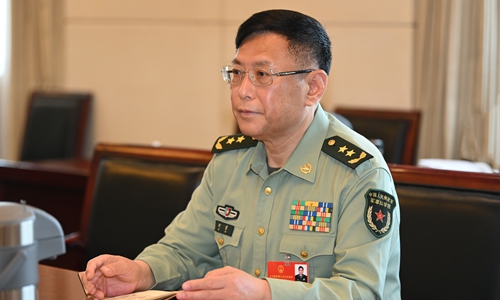Militaries need legal support for humanitarian missions
By He Lei Source:Global Times Published: 2020/6/3 19:08:40

Lieutenant General He Lei Photo: Courtesy of He Lei
Non-traditional security threats, including major natural disasters, public health issues, and terrorist attacks have been rising since the end of the Cold War. These threats seriously affect social security and people's lives. Thus, operations other than war, such as international humanitarian aid, have become an important new function of all countries' military contributions to peacetime.
When there are major catastrophic events, the military's efforts for international humanitarian relief are needed. These events are sudden and harmful, and they cover a wide range of possibilities for rescue missions.
In addition to professionals, the military is the most suitable and powerful force to conduct humanitarian relief missions. The military is an organized and well-equipped group with excellent discipline and training to conduct rapid responses for combat or peacetime operations.
International humanitarian aid can make up for the shortage of national rescue forces, maximize rescue efficiency, and enhance the unity and cooperation between a country and its military. For example, during the 2004 Indian Ocean earthquake and tsunami, China and many other countries participated in joint rescue missions; China, the US, Australia and other countries also sent their military forces during the searches for the lost Malaysia Airlines flight MH370; China, the US and Japan sent rescue teams to Haiti in 2010 following the catastrophic earthquake.
The Chinese military proactively participates in international humanitarian aid, demonstrating its responsibility as a major power. As a permanent member of the UN Security Council, China shoulders the responsibility of maintaining regional and world peace. It also actively promotes to build a community with a shared future for mankind.
A white paper released by China's State Council in July 2019 titled, "China's National Defense in the New Era" clearly states that, "China's armed forces will fulfill their international responsibilities and obligations, and provide more public security for the international community to the best of their capacity."
The Chinese military has proactively sent professional forces to disaster-stricken countries and provided these countries with medical assistance and materials. Since 2012, China has organized or participated in search and rescue missions in events that include: the disappearance of Malaysia Airlines flight MH370, the aftermath of Philippines' typhoon "Haiyan," Africa's Ebola fight, Nepal's earthquake in 2015, and so on. The Chinese People's Liberation Army (PLA) Navy's Type 920 hospital ship "Peace Ark," commissioned in 2008, has gone abroad nine times, and sailed more than 240,000 nautical miles. It has served 43 countries and regions and benefited over 230,000 people. During the COVID-19 fight, the PLA has also provided medical materials, technology, or dispatched expert groups to countries including Iran, Pakistan, Myanmar, Laos and Cambodia. The PLA's participation in international humanitarian aid efforts has been praised by the countries concerned and the international community.
The international community and relevant countries have formulated laws and regulations to better protect the military's participation in international humanitarian aid.
For example, a resolution titled, "Strengthening of the coordination of emergency humanitarian assistance of the United Nations" was adopted by the UN Economic and Social Council at its substantive 2008 session. The white paper titled "China's National Defense in the New Era" says China's armed forces will endeavor to provide strategic support for promoting world peace and development. Moreover, they will introduce China's active participation in humanitarian assistance and disaster relief programs.
In recent years, China has formulated many laws and regulations to endow its military forces with responsibilities of handling various emergencies. These include the Law of the People's Republic of China on Protecting Against and Mitigating Earthquake Disasters, and the Emergency Response Law of the People's Republic of China. These laws and regulations have provided a clear legal basis for the Chinese military's response to natural disasters, public health issues, major accidents, and social security incidents.
However, current legal norms are still imperfect. This may ultimately affect the military's international humanitarian relief efforts. The UN and relative international organizations should formulate comprehensive, authoritative and effective international laws and regulations to provide legal support for all countries' military forces to carry out international humanitarian missions.
The author is a deputy of the 13th National People's Congress and former vice president of the Academy of Military Sciences, People's Liberation Army. opinion@globaltimes.com.cn
Posted in: VIEWPOINT